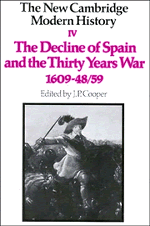Book contents
- Frontmatter
- INTRODUCTORY
- THE CENTRAL CONFLICTS
- THE UNMAKING AND REMAKING OF STATES
- Chapter XV The Spanish peninsula 1598–1648
- Chapter XVI French institutions and society 1610–61
- Chapter XVII The Habsburg lands 1618–57
- Chapter XVIII The fall of the Stuart monarchy
- CHAPTER XIX THE ENDING OF POLISH EXPANSION AND THE SURVIVAL OF RUSSIA
- 1 Poland–Lithuania 1609–48
- 2 Russia 1613–45
- THE FRONTIERS OF EUROPE
2 - Russia 1613–45
from CHAPTER XIX - THE ENDING OF POLISH EXPANSION AND THE SURVIVAL OF RUSSIA
Published online by Cambridge University Press: 28 March 2008
- Frontmatter
- INTRODUCTORY
- THE CENTRAL CONFLICTS
- THE UNMAKING AND REMAKING OF STATES
- Chapter XV The Spanish peninsula 1598–1648
- Chapter XVI French institutions and society 1610–61
- Chapter XVII The Habsburg lands 1618–57
- Chapter XVIII The fall of the Stuart monarchy
- CHAPTER XIX THE ENDING OF POLISH EXPANSION AND THE SURVIVAL OF RUSSIA
- 1 Poland–Lithuania 1609–48
- 2 Russia 1613–45
- THE FRONTIERS OF EUROPE
Summary
During the reign of Michael Feodorovich (1613–45), first tsar of the Romanov dynasty, Russia made a slow and painful recovery from the devastation wrought by the ‘Time of Troubles’. The peasants and Cossacks who had risen in revolt against the encroachment of serfdom lacked the ability to construct a new social order. After years of anarchy and civil war the country was exhausted; political passions were subsiding, and there was a general desire for a return to normality and order. Foreign intervention had stimulated national sentiment, expressed most forcibly in the successes of the popular levy [opolcheniye], which in the course of 1612 split the rebel Cossack forces, regained possession of the capital, and established a shadowy authority over most of the country. But the problems it faced were formidable in the extreme: Moscow lay in ruins; Novgorod and the north-west were occupied by the Swedes, and along the western border Polish armies were active; bands of fugitive peasants, Cossacks and Tartars freely roamed the countryside, burning and pillaging; over wide areas trade was at a standstill, and villages lay desolate and empty, silent witnesses to the cataclysmic violence of the storm that had swept over Russia. The Troubles had cost some two and a half million lives.
In January 1613 a national assembly [Zemsky Sobor] met to elect a new tsar. Apart from the peasantry, all social groups were represented. As was to be expected, the gathering was dominated by those elements most prominent in the opolcheniye: provincial serving men, townspeople and Cossacks. But considerable influence was also exerted surreptitiously by the clergy and such of the aristocratic boyars whose political reputation permitted them to be present. The debates were prolonged and acrimonious. A decision had first to be taken with regard to the Polish and Swedish candidates.
- Type
- Chapter
- Information
- The New Cambridge Modern History , pp. 602 - 619Publisher: Cambridge University PressPrint publication year: 1970



